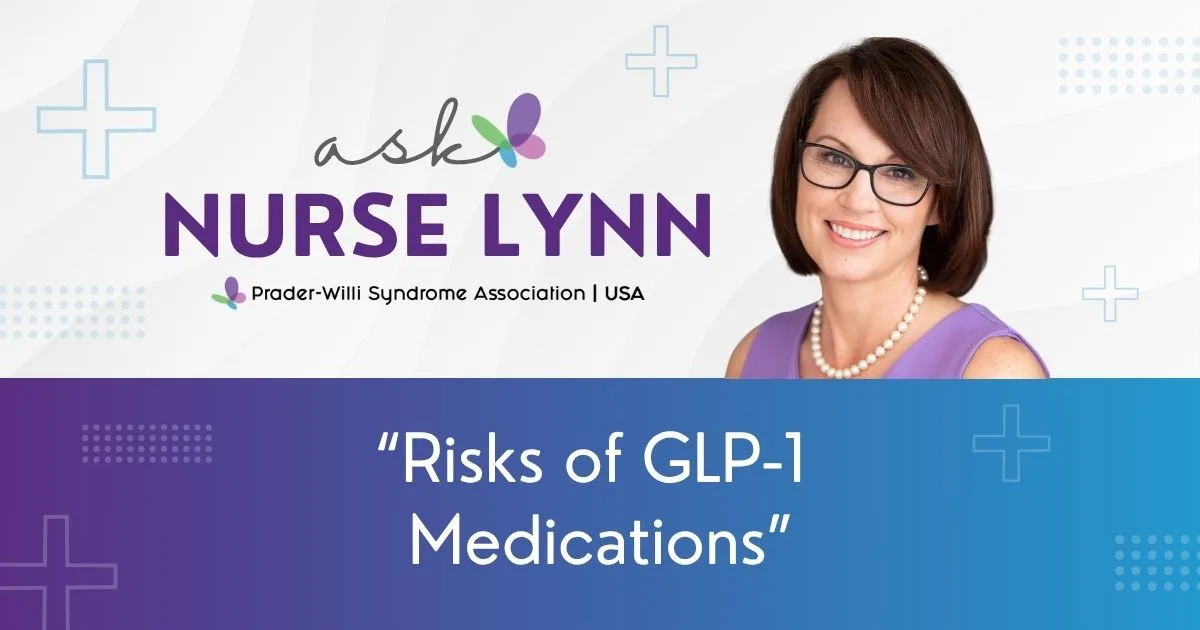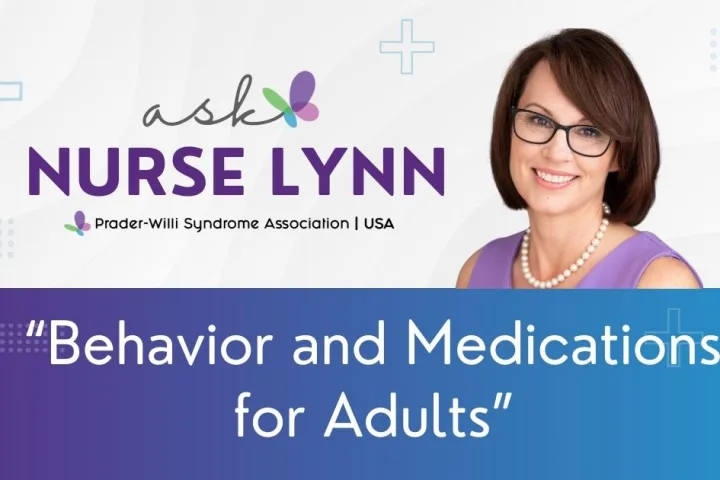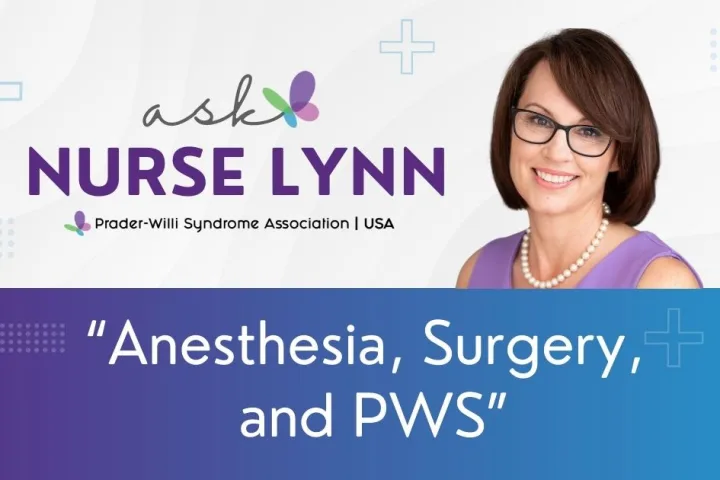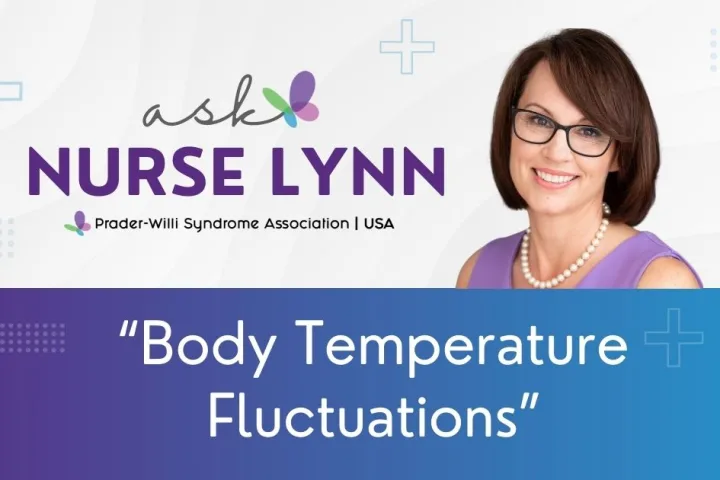Question:
Female, 40 years old, unknown subtype
My daughter’s GP, and she herself, want to try Mounjaro injections for 6 months. She will be closely monitored by her nurse, her GP, her care team and family. She currently does not appear to have issues with gastroparesis but I want to prevent them by changing her diet to the low fiber, low fat and frequent snack one recommended in the article “Hidden Gut Issues” on this website. Do you have any new information and/or advice on the Mounjaro or the prevention of digestive issues?
Nurse Lynn’s Response:
While your daughter has strong monitoring in place, it’s important to note that GLP-1 medications are considered high-risk for individuals with Prader-Willi Syndrome (PWS) due to their unique gastrointestinal vulnerabilities. Currently, there is one study underway in the United States evaluating the efficacy and safety of this class of medication in individuals with PWS, and hopefully more research will follow.
It’s clear that you’re doing your homework, and your instinct to proactively adjust her diet before any issues arise is absolutely appropriate. Based on current expert guidance, it is essential to have a thorough discussion with her GP and care team about the lack of long-term safety data and the very real risks associated with GLP-1 use in people with PWS.
If you and her healthcare provider decide to proceed with a GLP-1 medication, be alert for warning signs that may indicate serious complications, such as:
- -Complaints of abdominal fullness or bloating
- -A firm or distended abdomen, or refusal to eat
- -Drooling, pale skin, or episodes of fainting
- -Sudden behavioral changes or lethargy
These symptoms may be early indicators of gastric necrosis or rupture—a life-threatening emergency in individuals with PWS—and require immediate medical attention.
Resources:
Please see the following links:
https://ipwso.org/wp-content/uploads/2025/02/GLP-1-statement.pdf?utm_source=chatgpt.com
https://www.pwsausa.org/wp-content/uploads/2022/12/Nutrition-Adolescence-Adult-Revised-Aug-2022.pdf
https://academic.oup.com/jcem/article/108/1/4/6736895
Do you have a non-emergency medical question for Nurse Lynn? Submit your question here:
Share this!





 Perry A. Zirkel has written more than 1,500 publications on various aspects of school law, with an emphasis on legal issues in special education. He writes a regular column for NAESP’s Principal magazine and NASP’s Communiqué newsletter, and he did so previously for Phi Delta Kappan and Teaching Exceptional Children.
Perry A. Zirkel has written more than 1,500 publications on various aspects of school law, with an emphasis on legal issues in special education. He writes a regular column for NAESP’s Principal magazine and NASP’s Communiqué newsletter, and he did so previously for Phi Delta Kappan and Teaching Exceptional Children. Jennifer Bolander has been serving as a Special Education Specialist for PWSA (USA) since October of 2015. She is a graduate of John Carroll University and lives in Ohio with her husband Brad and daughters Kate (17), and Sophia (13) who was born with PWS.
Jennifer Bolander has been serving as a Special Education Specialist for PWSA (USA) since October of 2015. She is a graduate of John Carroll University and lives in Ohio with her husband Brad and daughters Kate (17), and Sophia (13) who was born with PWS. Dr. Amy McTighe is the PWS Program Manager and Inpatient Teacher at the Center for Prader-Willi Syndrome at the Children’s Institute of Pittsburgh. She graduated from Duquesne University receiving her Bachelor’s and Master’s degree in Education with a focus on elementary education, special education, and language arts.
Dr. Amy McTighe is the PWS Program Manager and Inpatient Teacher at the Center for Prader-Willi Syndrome at the Children’s Institute of Pittsburgh. She graduated from Duquesne University receiving her Bachelor’s and Master’s degree in Education with a focus on elementary education, special education, and language arts. Evan has worked with the Prader-Willi Syndrome Association (USA) since 2007 primarily as a Crisis Intervention and Family Support Counselor. Evans works with parents and schools to foster strong collaborative relationships and appropriate educational environments for students with PWS.
Evan has worked with the Prader-Willi Syndrome Association (USA) since 2007 primarily as a Crisis Intervention and Family Support Counselor. Evans works with parents and schools to foster strong collaborative relationships and appropriate educational environments for students with PWS. Staci Zimmerman works for Prader-Willi Syndrome Association of Colorado as an Individualized Education Program (IEP) consultant. Staci collaborates with the PWS multi-disciplinary clinic at the Children’s Hospital in Denver supporting families and school districts around the United States with their child’s Individual Educational Plan.
Staci Zimmerman works for Prader-Willi Syndrome Association of Colorado as an Individualized Education Program (IEP) consultant. Staci collaborates with the PWS multi-disciplinary clinic at the Children’s Hospital in Denver supporting families and school districts around the United States with their child’s Individual Educational Plan. Founded in 2001, SDLC is a non-profit legal services organization dedicated to protecting and advancing the legal rights of people with disabilities throughout the South. It partners with the Southern Poverty Law Center, Protection and Advocacy (P&A) programs, Legal Services Corporations (LSC) and disability organizations on major, systemic disability rights issues involving the Individuals with Disabilities Education Act (IDEA), Americans with Disabilities Act (ADA), and the federal Medicaid Act. Recently in November 2014, Jim retired.
Founded in 2001, SDLC is a non-profit legal services organization dedicated to protecting and advancing the legal rights of people with disabilities throughout the South. It partners with the Southern Poverty Law Center, Protection and Advocacy (P&A) programs, Legal Services Corporations (LSC) and disability organizations on major, systemic disability rights issues involving the Individuals with Disabilities Education Act (IDEA), Americans with Disabilities Act (ADA), and the federal Medicaid Act. Recently in November 2014, Jim retired.